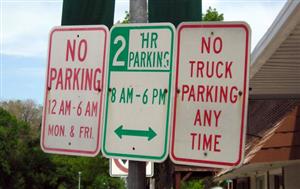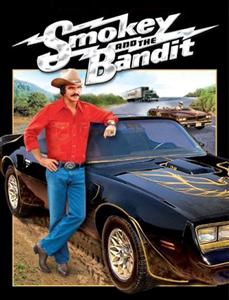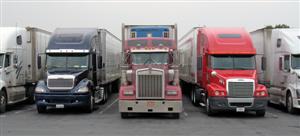DECEMBER 2010 TRUCKER TALK
THE ROAD AHEAD
BY WRITER & DRIVER KIM GRIMM
The world of trucking is always changing. There is currently a lot of debate going on in regards to on-board recorders, hours-of-service, parking and the never-ending saga of the constant struggle between shippers, receivers and truck drivers. Many of us (drivers) are not looking forward to the seemingly impending changes on the horizon, but maybe they aren’t as bad as they seem.
You know how people sometimes say be careful what you wish for – well, electronic on-board recorders may just be one of those things. Most drivers have been resistant of these intrusive devices that track their every move, but maybe, in the end, they could help us.
Listening to Dave Nemo on the radio the other day, their conversation about on-board recorders and other issues got me thinking. Many of the problems drivers have faced for years, like not getting paid to wait, parking and getting speeding tickets, may change one day soon if legislators get their way. Could these possible changes offer us some new hope in regards to solving some of these old problems?
Not long ago, we didn’t have many of the electronic gadgets that we have today. I know that some companies that have been using electronic logs for years, but I am not alone in feeling that I never wanted to use them. But, as I think about it now, maybe they wouldn’t be so bad. Most of us scream at the thought of electronic on-board recorders (EOBRs), but what if we could use them to our advantage? There would be an undisputable record of when we arrived at a shipper or receiver, and a record of just how many hours we wasted sitting at a dock. If companies used this information to charge proper detention time fees, maybe drivers could finally be compensated for their wait times. After all, sitting at a dock, waiting to be loaded, burns up valuable driving time.
 A new EOBR rule will go into effect on June 6, 2012. It will require carriers that violate hours-of-service rules 10% of the time or more, based on a single compliance review, to install EOBRs on all of their trucks to track their drivers’ hours. And I’m sure that many of you have already heard about the company out of Greeley, CO that has been ordered to install EOBRs on all of their trucks (over 700 of them) or pay an $82,000 fine. Eventually, there will be no choice, as groups like PATT (Parents Against Tired Truckers) and CRASH (Citizens for Reliable And Safe Highways) are screaming for these recorders to be in all trucks. But, I wonder how these EOBRs will help the cars that actually cause 75% of the truck crashes? Will these EOBRs somehow make car drivers better?
A new EOBR rule will go into effect on June 6, 2012. It will require carriers that violate hours-of-service rules 10% of the time or more, based on a single compliance review, to install EOBRs on all of their trucks to track their drivers’ hours. And I’m sure that many of you have already heard about the company out of Greeley, CO that has been ordered to install EOBRs on all of their trucks (over 700 of them) or pay an $82,000 fine. Eventually, there will be no choice, as groups like PATT (Parents Against Tired Truckers) and CRASH (Citizens for Reliable And Safe Highways) are screaming for these recorders to be in all trucks. But, I wonder how these EOBRs will help the cars that actually cause 75% of the truck crashes? Will these EOBRs somehow make car drivers better?
Here’s yet another thought about EOBRs – if we all have electronic logs and they are always current, the states would lose a bundle on falsification and out-of-service tickets! What about speed limiters? I am very opposed to them myself, but what would happen if all that revenue collected from speeding tickets suddenly went away? I can hear it now, “Officer, my truck CAN’T go that fast!” I wonder if the lawmakers have thought about this revenue loss, and, if so, what kind of tax are they pondering to make up for it? We have a lot of new members of Congress now, and who knows how they will feel or vote on trucking issues, but if we can educate them, just maybe we can start seeing some significant changes (that make sense) in our industry.
I think the shipper-receiver issue has been around almost as long as trucking. The shippers and receivers have better lobbyists than us drivers, so they almost always win whenever a dispute arises. And let’s be real – the big challenge is trying to get drivers to stick together to make the necessary changes. We’ve been trying to do it for years, but it never seems to happen. I think satellite radio has been very beneficial in educating drivers and letting us know what’s going on in Washington D.C. Now, we can find out when and where we can speak our minds on a proposed issue – I am not sure if they are listening or not, but at least we can contribute. We can now find out what is happening in real time, not just when it’s too late and the bill is already passed. And shame on us if we don’t take the time to leave a reasonable response, not just a radical opinion.
We are also currently waiting for new Hours-of-Service (HOS) rules to be announced, but, of course, they have been postponed again. Rumors are flying about FMCSA cutting driving back to 10 or even 8 hours a day, and they might extend the restart. When the new rules come out, we will have a much better idea of how they are going to impact us. Maybe we could use the speculation to think about what we would like to tell them in the comment period after the new rules are proposed. But, for now, we wait. Listen to the Road Dog channel on XM and Sirius (satellite radio) for phone numbers to call so you can at least put in your two cents on the issue – whether they listen or not. The only power we have is our numbers, and if enough of us intelligently comment on the subject, they just might start listening!
 If the FMCSA does decide to cut back our driving hours, it doesn’t take a genius to figure out just how much that will cut down on the productivity of the trucking industry. But truck drivers know how much it will cost. You want to cut our driving time – why don’t you increase our home time and hey, by the way, pay us for all of that sitting we do! I heard another comment that made a lot of sense – we are the only industry that begs for more hours. Think about it!
If the FMCSA does decide to cut back our driving hours, it doesn’t take a genius to figure out just how much that will cut down on the productivity of the trucking industry. But truck drivers know how much it will cost. You want to cut our driving time – why don’t you increase our home time and hey, by the way, pay us for all of that sitting we do! I heard another comment that made a lot of sense – we are the only industry that begs for more hours. Think about it!
With fatal truck crashes down 20% and almost 75% of truck crashes caused by cars, I would think that maybe they should try a different avenue than the hours-of-service to remedy this “safety” problem. For years, I have thought that a real truck should be used in every driver education class. The only way you can really teach what it’s like to be in a truck, and see the blind spots, is to actually sit in the driver’s seat of a big truck – not just read about it in some book! As many of us have said for years, shippers should ship, receivers should receive, and drivers should drive. Most of us didn’t become truck drivers so that we could operate forklifts, be lumpers, or let our trailers be rolling warehouses for businesses that don’t want to keep a big inventory.
Over the years, I have delivered to some great shippers and receivers. Years ago, I delivered to a drug store warehouse north of Sacramento, CA. The driver had to be on the dock while being unloaded, but they weren’t allowed to touch one piece of freight. There was a sign on the dock that said the last month’s inventory was 100%. Another receiver that stands out in my mind was the Target store in Florida. When I got assigned the dock and asked how much the lumper would be, I was told there is no charge and that they would call me on the radio when they were finished! If some companies can operate this way, why can’t they all? Does it really cost that much more to do it right the first time and to make your operation efficient? I don’t think so!
Another major problem that may be amplified by a cut in driving hours is parking – but there might be hope in that area, too. I am hearing about the state of Virginia starting a test program for truck parking areas along I-66 and I-64. There will be a 90-day test period with a 60-day review period in which they will leave the areas open while going over the data that is collected. These areas won’t be full-blown rest areas, but instead they will just have portable toilets. Hopefully, a handful of bad drivers won’t ruin this opportunity for everyone. It’s like being back in high school, when your class got punished for what another class did, and you didn’t get to go on that cool trip or something. It’s the classic “everyone pays for what only a few do” scenario. How hard is it to use a trash can?
Let’s hope that this program is a success and that more states will adopt similar practices. With all the rest areas being closed to save the states money, it doesn’t negate the need for safe places for truckers to park. “Jason’s Law” was introduced after a young truck driver named Jason Rivenburg was shot and killed while in his truck after being forced to park in a not-so-safe area in South Carolina. The purpose of “Jason’s Law” is to provide secure areas for truck drivers to rest or wait until they can unload their trucks. To find out more about “Jason’s Law” or to sign their petition, visit www.jhlrivenburg.com.
There are huge “truck only” parking areas along the Indiana Toll Road. In Wyoming, along I-80, there are several pull-offs that offer “truck only” parking and trash cans. It would be nice to have portable toilets, too, but it’s still better than having no place to park at all. But, as truck drivers, we need to respect these areas and keep them safe and clean so they continue to exist. If we abuse these areas, they will just shut them down, and we’ll be forced to park elsewhere.
To stay competitive in trucking, I think drivers are going to have to get technologically literate. Much of what we do (besides driving) is done with the help of a computer and the internet: many loads are now found on load boards; you can now get permits for oversize loads, have them sent to your computer, and then print them yourself; there are e-logs; the states have access to our driving records via the computer; and the list goes on and on. Now is the time, if you haven’t already, to learn how to use this technology to your advantage. Truth is, like everything else, it’s either adapt or die – and trucking is no different.
The “Smokey and the Bandit” days are long gone, but some of us can still remember those times fondly. But, we have to keep up-to-date with all the changes coming down the road of our profession, or we will find ourselves out of business. And, maybe these new technologies and rules that we have been dreading and avoiding for so long may actually help us in the long run. Only time will tell, but they are coming, so we might as well stop worrying and start looking for the positives.
